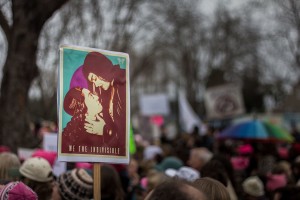 Here at Unmarried Equality, we would like all major political parties to take seriously our mission of “fairness and equal treatment of all people regardless of marital status.” If voting patterns are any indication, though, unmarried Americans generally see the Democratic party as more attuned to their concerns than the Republicans.
Here at Unmarried Equality, we would like all major political parties to take seriously our mission of “fairness and equal treatment of all people regardless of marital status.” If voting patterns are any indication, though, unmarried Americans generally see the Democratic party as more attuned to their concerns than the Republicans.
The preferential identification with progressive ideologies and the Democratic party is especially characteristic of unmarried women. For example, in 2016, Clinton prevailed over Trump by 31 percentage points among unmarried women (63% for Clinton vs. 32% for Trump). Among unmarried men, Clinton won by just 2 points, 46% to 44%.
Married people also have preferences, but they are generally the reverse of unmarried people’s, especially (or sometimes only) for men. For example, married men overwhelmingly voted for Trump, 57% to 38%. Married women favored Clinton by just 2 percentage points (49% to 47%), compared to the 31-point difference for unmarried women.
Similar patterns have been evident in other elections. In 2012, for example, Romney won both married men and married women, but he won married men by much more (62% vs. 53%). Obama won both unmarried men and unmarried women, but again, it was the unmarried women who were especially likely to favor the Democrat (67% compared to 55%). (Data are from here, here, here, and here.)
The different party preferences of unmarried and married Americans map onto the different platforms and policies of the Republicans and the Democrats. “Family values” is featured prominently in the Republican platform – and “family” is often a shorthand for married heterosexual families with children who were born after their parents married. The Democratic platform takes issues of institutional discrimination seriously – or at least it does so with regard to matters such as gender discrimination, racial discrimination, and discrimination based on sexual orientation or gender identity, but so far, not marital status discrimination.
Beyond Party Platform and Policies: Another Reason Why Unmarried Women Vote Disproportionately for Democrats
A new study suggests another way of understanding the party preferences of unmarried Americans compared to married Americans, though the research focused only on women. What matters, according to political scientists Christopher Stout, Kelsy Kretschmer, and Leah Ruppanner, is whether women see what happens to them in their own lives as linked to what happens to women more generally. They call this “gender linked fate.”
Unmarried women do typically think of themselves this way. They think that if women in general are doing well in the country, then they will probably do well themselves, and if women generally are not doing well, they probably will not do well either. Married women are much less likely to think that way. They don’t think that how well they do, personally, has all that much to do with how well women are doing in general.
Importantly, whether a woman sees her own fate as linked to the fate of other women is tied to party and ideological preferences. Women who see their own fate as tied to the fate of other women identify more as Democrats and liberals than women who do not see their fate that way.
The authors believe that the more conservative views of married women and the more progressive views of unmarried women are about power and resources. With regard to those who are married:
“Women consistently earn less money and hold less power, which fosters women’s economic dependency on men. This dependency increases if women reduce employment and rely on husbands’ earnings following the birth of a child. Thus, it is within married women’s interests to support policies and politicians who protect their husbands and improve their status.
“Some married women perceive advances for women, such as lawsuits to mitigate pay discrimination, as coming at the expense of their male partners. In part, this captures the shift in married women’s alliances from the individual to the marital union.”
It is different for women who are not married:
“Women who depend on their own income are more supportive of feminist issues such as abortion, sexual behavior, gender roles and family responsibilities, which widens the political gap between single and married women.”
Not Just About White Women: Gender Linked Fates and Party Preferences Were Studied Among Black and Latina Women, Too
Gender linked preference was assessed in 2012 in the American National Election Study. More than 2,000 women were asked:
“Do you think that what happens generally to women in this country will have something to do with what happens in your life?”
Anyone who answered yes was then asked:
“How much does what happens to others affect you?”
The participants included 405 Latina women, 489 Black women, and 1,476 White women. Among the Whites and the Latinas, the women who had always been single were more likely than the married women to see their own fates as tied to the fates of other women. That was true even when other ways that single and married women differ were taken into consideration. For the Black women, the married and always-single women did not differ much; instead, it was the divorced women who were especially likely to see their own fate as linked to the fate of other women.
Participants indicated their party preferences on a scale ranging from “strong Democrat” to “strong Republican.” They recorded their ideology on a similar scale ranging from “extremely liberal” to “extremely conservative.”
For the Latina and White women, seeing their own fate as connected to the fate of women in general was important to their party and ideological identification. The women who thought of their fates as linked were more likely to identify as Democrat and liberal. Those beliefs did not matter so much for the party preferences of Black women, for a telling reason: They identify overwhelmingly as Democrats. It is hard to separate those who identify as Democrat from those who identify as Republican by other factors, such as gender linked fate, when there are so few who identify as Republican.
Aren’t Other Factors More Important Than Beliefs About Common Fates?
Answers to questions about gender linked fate mattered, but how much? There are other ways that unmarried and married women differ that could account for why unmarried women are more likely to vote Democratic. They include differences in:
- their income
- whether they have children at home
- their employment status
- their racial linked fate (analogous to gender linked fate)
- attitudes about traditional gender roles (“Do you think it is better, worse, or makes no difference for the family as a whole if the man works outside the home and the woman takes care of the home and family?”)
- perceptions of gender discrimination (a question about whether sexism limits women’s career opportunities)
The authors tested all these other potential explanations for why unmarried women more often identify as Democratic than married women do. Some of these factors did matter. For example, among Whites, the women who perceived more gender discrimination were more likely to identify as a Democrat. Among Latinas, income mattered. But overall, none of these factors mattered more than gender linked fate. The results suggest that, of all the explanations tested, the most important reason why unmarried women, more often than married women, vote for the Democrat is because they are more likely to see their own personal outcomes as linked to those of women in general.
An Expansive Note and a Note of Caution
One note of caution: The study I have been describing compares women of different marital statuses at one point in time. A more powerful study would follow the same women over time, as they stay single or get married, stay married or get divorced or become widowed, to see whether their perceptions of gender linked fate, and their party and ideological identifications, change accordingly.
And finally, an expansive note, that goes beyond the data: One of the entrenched stereotypes about single people is that they are self-centered. It is also one of the most powerfully debunked stereotypes. In many ways, it is the single people who have been shown to be more caring, more connected to other people, and more giving than married people.
When married people seem to be doing more, their efforts are often focused on their own families. For example, men who marry work more hours and that extra pay benefits themselves and their families. But it is the single men who put more into the kinds of organizations whose work benefits people beyond just themselves and the people closest to them. For example, they participate more in unions, farm organizations, and professional societies.
The new political science study showed that unmarried women, more so than married women, think of their own fates as tied to the fates of women in general. I think that’s another way in which unmarried people are just the opposite of self-centered. They are not in a bubble, the way some married people seem to be. Unmarried women see their own fate, and the fate of women in general, as connected. Then they vote in ways they see as improving the lives of all women.
[Notes: (1) The opinions expressed here do not represent the official positions of Unmarried Equality. (2) The comment option on the UE website has been invaded by spammers, so I have disabled comments for now. I’ll post all these blog posts at the UE Facebook page; please join our discussions there. (3) For links to previous columns, click here.]
 About the Author: Bella DePaulo (PhD, Harvard), a long-time member of Unmarried Equality, is the author of Singled Out: How Singles Are Stereotyped, Stigmatized, and Ignored, and Still Live Happily Ever After and How We Live Now: Redefining Home and Family in the 21st Century, among other books. She writes the “Living Single” blog for Psychology Today and the “Single at Heart” blog for Psych Central. Visit her website at www.BellaDePaulo.com and take a look at her TEDx talk, “What no one ever told you about people who are single.”
About the Author: Bella DePaulo (PhD, Harvard), a long-time member of Unmarried Equality, is the author of Singled Out: How Singles Are Stereotyped, Stigmatized, and Ignored, and Still Live Happily Ever After and How We Live Now: Redefining Home and Family in the 21st Century, among other books. She writes the “Living Single” blog for Psychology Today and the “Single at Heart” blog for Psych Central. Visit her website at www.BellaDePaulo.com and take a look at her TEDx talk, “What no one ever told you about people who are single.”


